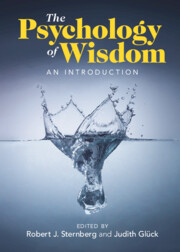Book contents
- The Psychology of Wisdom
- The Psychology of Wisdom
- Copyright page
- Contents
- Figures
- Tables
- Contributors
- Preface
- Part I Introduction to Wisdom Theory and Research
- Chapter 1 Introduction
- Chapter 2 Philosophical Foundations for the Study of Wisdom
- Chapter 3 Folk Conceptions of Wisdom around the World
- Chapter 4 Psychological Theories of Wisdom
- Chapter 5 Wisdom
- Chapter 6 Measurement of Wisdom
- Part II Foundations of Wisdom in the Individual and in the World
- Part III The Modifiability of Wisdom
- Part IV Wisdom in the World
- Index
- References
Chapter 5 - Wisdom
Situational, Dispositional, or Both?
from Part I - Introduction to Wisdom Theory and Research
Published online by Cambridge University Press: 26 May 2022
- The Psychology of Wisdom
- The Psychology of Wisdom
- Copyright page
- Contents
- Figures
- Tables
- Contributors
- Preface
- Part I Introduction to Wisdom Theory and Research
- Chapter 1 Introduction
- Chapter 2 Philosophical Foundations for the Study of Wisdom
- Chapter 3 Folk Conceptions of Wisdom around the World
- Chapter 4 Psychological Theories of Wisdom
- Chapter 5 Wisdom
- Chapter 6 Measurement of Wisdom
- Part II Foundations of Wisdom in the Individual and in the World
- Part III The Modifiability of Wisdom
- Part IV Wisdom in the World
- Index
- References
Summary
Some people think wisdom is a stable and invariable individual disposition. Others view wisdom as deeply embedded in culture, experiences, and situations, and treat these features as mutually making up wisdom. What are the implications of each view for measurement, training, and the fundamental nature of wisdom itself? This chapter reviews evidence concerning the dispositional versus situational approaches to study wisdom. Even though main features of wisdom show some stability, there is also a profound and systematic variability in response to situational demands. By conceptualizing dispositions as a distribution of situation-specific responses, one can integrate dispositional and situational approaches to wisdom. Building on these insights, it is recommended to pay attention to contextual factors in measurement. Insight about contextual factors can also shed light on how to develop interventions for training wisdom.
- Type
- Chapter
- Information
- The Psychology of WisdomAn Introduction, pp. 70 - 88Publisher: Cambridge University PressPrint publication year: 2022
References
- 2
- Cited by

